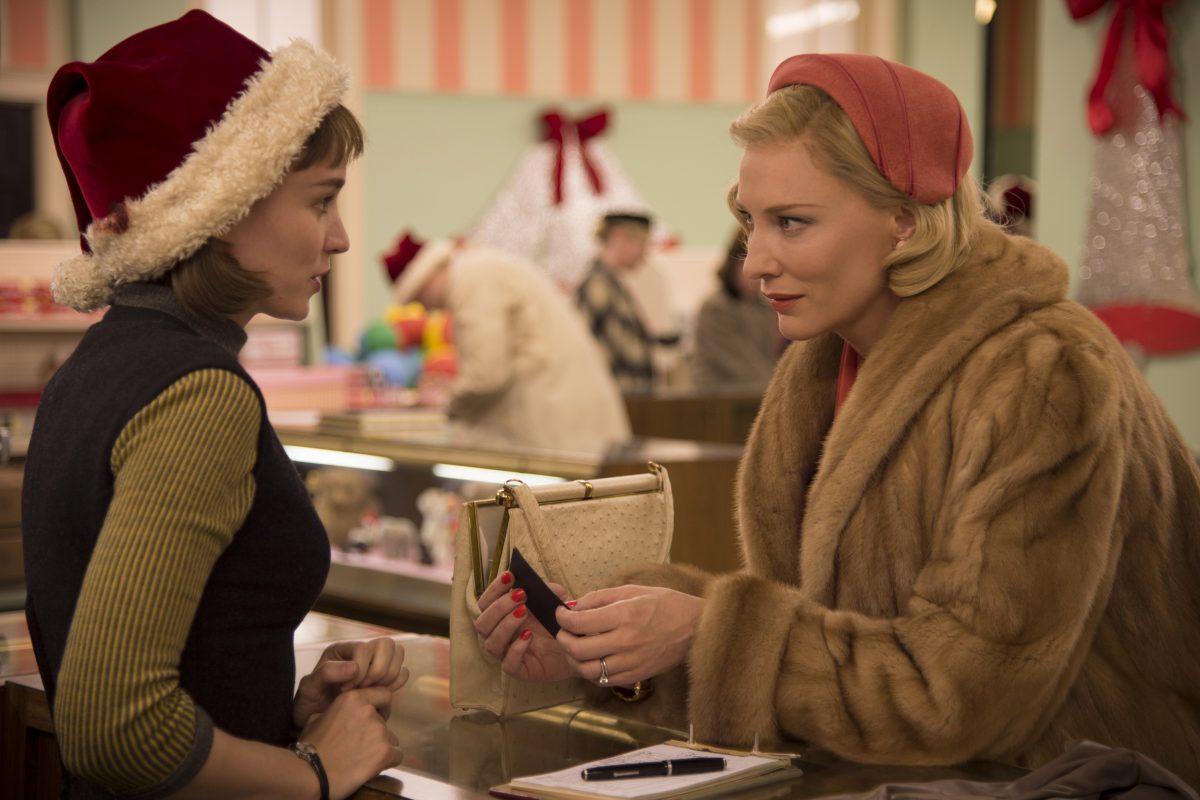
Never has the impossible glamour of Cate Blanchett been used to better effect than in Todd Hayne’s ravishing and romantic Carol. It is the early 1950s, Christmastime in New York City, and shop girl Therese Belivet (Rooney Mara) is forced to wear a rather dorky Santa hat as she mans her post. From across the crowded department store, she spies Carol (Blanchett)—perfectly manicured nails, mink coat, an air of distracted importance about her—and she is instantly captivated. She looks away to help a customer, briefly, then is dismayed when she looks back up and this vision of perfection is gone—until suddenly Carol is standing in right front of her, inquiring about a doll.The attraction is clearly mutual—they make overlong eye contact; their small talk sparks with just a hint of flirtation—and right before she leaves, Carol teases, “I like your hat.” Then, in what is either a happy coincidence or a calculated move, Therese sees that Carol has left behind her gloves, which gives her an excuse to contact her.
The wonderful Mara—who has the elfin beauty of a young Audrey Hepburn —makes it clear that Therese has never experienced anything like this before—her attraction to Carol is an awakening of sorts, and it consumes her. But for the older Carol, things are much more complicated. She is separated from her husband (who possesses perhaps the least musical name in the history of cinema: Harge). She is a lesbian, has always known she was a lesbian, and her brief affair with her longtime friend Abby (Sarah Paulson)—who is also the godmother of her young daughter Rindy—is one of the things that precipitated the breakup. And Harge, played with a kind of sweaty exasperation by Kyle Chandler, is bitter, confused, and still wants his wife. A small part of him hopes that Carol will come to her senses, want what he wants—country club parties, Christmas with the family, normalcy—but as he senses her drifting farther away, he uses his only weapon against her: He hires a lawyer and threatens to take away their child.
“Morality clause,” Carol later repeats to Abby, rolling the phrase around her tongue with disgust. (There is no one who can deliver a single line quite like Blanchett. “Invite me around,” she says to Therese at one point—and the suggestion is positively heady with possibility.)
As for Therese, she has a boyfriend herself, an impossibly dull and sweet chap named Richard (Jake Lacey), who calls her “Terry.” So when a glamorous woman in sunglasses and an expensive car comes to pick up his girl for a weekend getaway, he stands stupidly on the curb, dumbfounded.
“Therese speaks so highly of you,” Carol says, her manners impeccable, as always.
“That’s…swell,” he replies.
The early scenes between Carol and Therese, as they explore, but don’t consummate, their mutual attraction, are some of the most swooningly romantic ever committed to film. Mostly, we see Carol through Therese’s eyes—and sometimes through the lens of her new camera (she’s a budding photographer)—as she studies and memorizes her new object of affection. Every one of Carol’s gestures—a fleeting brush of the skin, a smile, even the way she changes of the station on the car radio—has erotic possibility for Therese. Behind her camera, Therese is able to get close to Carol in a way that she can’t quite in person. And Carol resists being the seducer. She waits, patiently, until finally it is Therese who says, plainly, “Take me to bed.”
Haynes, along with his brilliant cinematographer Edward Lachman, films all of this with a grainy film stock, the shadows, saturated colors, and sense of moody isolation evoking an Edward Hopper painting. The film, which is written by Phyllis Nagy based on Patricia Highsmith’s novel The Price of Salt, could’ve turned into a political film about the scourge of intolerance, the unfairness of a world where we’re not free to love who we want—and, of course, it is those things. But mostly it’s interested in sex and beauty and longing. The fact that Carol and Therese have to hide their love makes it that much more ardent. The contrast between what they present to society—two platonic friends, out to lunch or on a road trip—and what’s burning beneath the surface, is what gives their scenes such potency.
“I like to watch what the characters say versus what they mean,” a cinephile friend of Therese’s says at one point. In Carol, gestures and words are mere artifice—but love sees the truth.
